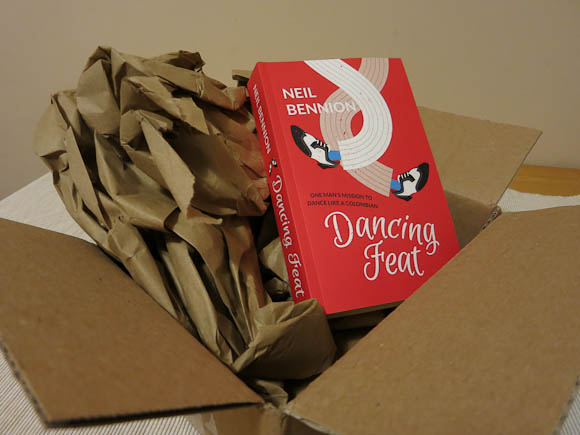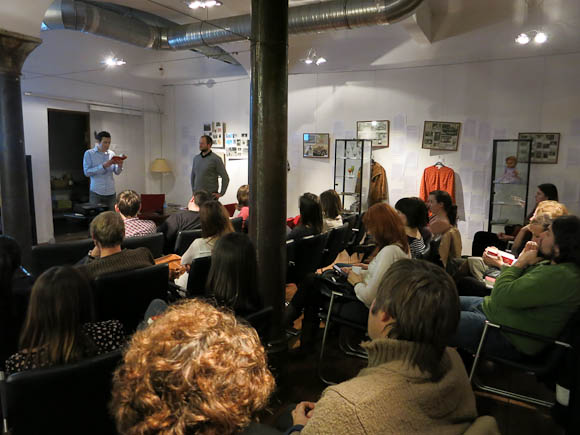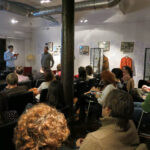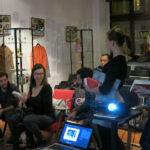Book launch events for traditionally published authors are quite common, but not so much for indie authors.
And one thing about being indie-published is that it’s all down to the author. If you (the author) don’t organise a launch event, then who will?
As Dancing Feat was my first published book, I decided I wanted to have a proper launch – after all, it might be the only time I ever do it. And if that’s the case, it’s better to do it for the first book than, say, the ninth.
I decided to organise it in Wroclaw, Poland. Firstly, because I love the place and spend a lot of time there and secondly because I had friends and acquaintances there who were asking for a copy of my book. Amazon (my main distributor) do deliver there, but only if you don’t mind the added cost and inconvenience of ordering from a neighbouring territory.
Anyhow, this is what I learnt…
Ordering the books
If you’re going to do a book event – and especially a book signing – it helps to have some actual books.
The modern approach to self-publishing is Print On Demand (POD), which means that customers can buy books on a one by one basis, and the author pays nothing up front – any costs come out of the cover price. But for an event you’ll have to buy in bulk somehow.
My event:
I ordered a box of 30 to be shipped from the USA to Poland direct from the printers (Createspace). I had to stump up some tax or other, apparently based on weight, but it didn’t add significantly to the price
There was a risk in ordering in batch from such a big distance – if there was a problem with the batch, then I’d have to ship them back to the USA, and postpone the event. Fortunately the books were all fine. Well, apart from the jokes inside, which apparently aren’t the responsibility of the printing company. Although I did complain.

Choosing a venue
You need somewhere to host the event, appropriate to the nature of your event. But there are so many factors here. What time do want to run the event? Do you want it to be business-like or more casual? Will they object to the use of fireworks and dancing elephants?
Basically, you’re now in the world of (minor) event management, sounding out various venues and trying to work out the pros and cons of each. If you’ve organised previous events then you should be fine, but otherwise it might be a good idea to get help and pointers from someone with experience.
I suggest writing down exactly what you want. Then throwing that in the bin and picking a place at random from all the ones that don’t charge. The important thing is to approach more than one venue, so you can stroke your own ego by rejecting a whole bunch of them.
My event:
I’ve co-organised events before in Wroclaw, so I had a good feel for the possible venues, but it still took quite a bit of time to find the right place.
For instance, I approached an independent book store as it seemed appropriate and I figured they’d be accustomed to running such things. But they weren’t making particularly enthusiastic noises (I’d been hoping for some kind of purring), plus the layout wasn’t ideal and they had an early closing time. So instead I ended up going with a cultural centre who were a much better match.
Preparing the talk
There’s a good chance that at some point in the evening, you’re going to have some kind of talk, or presentation, or even a reading. I mean, you’re going to want some kind of “I wrote a book!” bit at some point – right?
Even if you’re only doing a reading or two, it still helps to prepare what you’re going to say. It helps you to refamiliarise yourself with your own work and the cadences within (along with the pronunciation of any fancy words that you only put in there to make yourself look clever).
If you think “I’ll just stand up and say a few words – I’ll be fine” then be aware that a lack of preparation is the single most frequent cause of rubbish talks. And as a former TEDx organiser I’ve seen the narrative ‘Speaker thinks they don’t need to prepare… speaker does bad talk’ many times. It’s not clever – it’s just amateurish. Prepare it, practise it and time it. If you’re nervous, consider going to the venue and practising there at least once – the more things you are familiar with, the more comfortable you’ll feel.
Also make sure that your talk can be done without the internet – any music and visual content should be stored locally (assuming legality). The more dependent you are on technology, the worse things are. You can’t prepare for a meteorite hitting the venue, but you can make sure you have some basic notes on flashcards in case your hard disk fails or the electricity goes off.
My event:
I’ve done quite a bit of public speaking before, so I’m comfortable with this aspect, but it still took plenty of time to prepare. In fact it was the most time-consuming aspect of the whole thing. Not least because it was a 45-minute presentation, so there’s no such thing as a ‘quick run-through’.
The challenge was to give enough to interest the audience. I wanted to stimulate interest in what I’d written, but I also wanted it to be enjoyable whether or not they bought the book. So I mixed in a bunch of photos, music, dance and readings to try and keep things engaging.
Inviting people
There’s definitely an art (and/or science) to getting the numbers right. Too few people at an event is mildly embarrassing (and would make you wonder why you’d bothered). Too many, and you’d have to turn people away once the place is full. Which would be good for your own ego, but your mum might never forgive you.
Predicting turnout for a Facebook-listed event is an issue. People might click ‘going’ or ‘maybe’, but as my friend Michal, local TEDx curator, puts it, “They’re all maybes.” It doesn’t help that some people will click ‘going’ just to express their support for you (though admittedly a nice gesture).
You can issue tickets e.g. via Eventbrite (which is free if your event is also free), but that could well be overkill for an event like this, and nothing will actually make your figure truly accurate.
If you do take this route, be aware that you may have to overbook to get a full house. Maybe try to have standing room at the back. That way you can aim at a range (e.g. 30-40 people) instead of a specific number, which will make your life easier.
My event:
I set up a Facebook event with the intention of advertising it on various local groups, but in the end I had to hold back because it quickly became clear that just with friends and acquaintances I’d likely have between 40 and 60 people. This was a good number, as any more than that and the event would start to become tricky to manage.
Checking the setup
Even with a small, informal event like this, you have to test the whole setup and try to avoid making assumptions. You need to give a chance for as many of those ‘unknown unknowns’ to surface as possible.
If at all possible, do a start-to-finish rehearsal. That’s how you iron out issues like not knowing where the light sockets are, or the cable not reaching from the socket to the projector, or the venue having a minor problem with uninvited alligators. Something will still likely go wrong, but that’s life. All you can do is to check as much as you can, and then improvise if things don’t work out.
Oh, and make anyone with an “It’ll be fine – you don’t need to prepare” attitude go and stand in the corner with a special hat.
My event:
I checked my laptop a couple of days before and discovered that it didn’t fit with the projector (the latter had a VGA cable; the former only accepted HDMI). No problem.
But when I turned up on the day, a different problem presented itself. The wall we’d agreed I’d be projecting onto was no longer available as the organiser of an event the following day was using it to exhibit period clothing. It was just one of those things – it’s a busy cultural centre running multiple events. You just have to mentally get over it as quickly as possible and make it work. Or cry and scream and stamp your feet. One of the two.
Determining tasks and recruiting help
It’s easy to imagine that you could run an event of 40 people or more completely on your own. But this says more about your powers of imagination than it does about such events. At the very least, your life will be made easier by people helping you.
Think about the experience of an event as a whole. Presumably you, the author, want to be greeting people as they come in, chatting, doing your talk and then signing books rather than faffing about taking coats off people.
So walk through every moment of the event and think about all the tasks. Who will be putting the food out whilst you’re in the middle of your talk? If it’s a private space, who will be answering the door bell? Fixing drinks? Selling the books? Taking photos? Introducing you to the stage?
Or were you planning on doing all of this yourself, whilst riding a skateboard, juggling flaming chainsaws and learning Quechua?
My event:
I was lucky enough to have some experienced people willing and able to help me, meaning I was able to focus on being an egomaniac without having to worry about putting out crisps.
Getting the venue ready and reminding people
People may really want to come, but if you don’t remind them on the day, then they can miss it without even realising. It’s much better to pester people than have a bunch of people say “Oh darn – did I miss it?” It’s also a good approach if you happen to like pestering people.
Try posting a photo (e.g. to Facebook) of yourself getting the venue ready – it’s makes for a visual, ‘like-able’ reminder. And of course it will guilt the crap out of people who are thinking about bailing.
My event:
I gave everyone a nudge on the day, and posted a photo of a well-known nearby landmark to help deal with ‘I don’t know where the hell that is’-type issues.
I turned up a couple of hours before hand and got the venue sorted out, setting out chairs and wiring up the equipment and the like. I had far more time than was necessary, but it’s better that way round. Says the man who’s never been early for anything in his life ever.
Waiting for it to start
Events of any kind have a similar feel to parties. You’re mentally oscillating between fears that the entire city will turn up and trash the place, and absolutely no-one will turn up at all, not even you. As long as you’ve prepared right it should be neither. Or one. Or the other. Probably not both, though.
My event:
I’ve heard it said that the weather is a big determinant – if it’s bad, then the turnout will suffer. The weather on the day was fine, but people were only trickling in. As the time to start the presentation approached, there were only 15 people.
Damn.
With 5 minutes to go, I was at the point of herding stray animals in off the street to take the remaining seats.
I delayed the start by 10 minutes to allow for stragglers, and it paid off, as quite a few more people arrived. In fact quite a lot more did. The seats were nearly full by the time we started, and by about halfway through the talk, there were people standing. And not just because they were trying to sneak out.
The talk
It’s a good idea to have someone else introduce you, because they can big you up in a way that you can’t, at least outside of self-parody.
“He’s an expert in his field and a legend in his own lifetime… please welcome: ME!”
Beyond that, it’s time to get out there, do your thing and (hopefully!) enjoy it. After all, this is the meat of the event. Don’t worry if you feel anxious at the start – you should find that you settle in to the role and become more comfortable with your situation the longer you’re up there. Though if people start throwing fruit then that’s usually a sign you need to cut to the chase.
My event:
It went pretty smoothly. I tried to self-sabotage by repeatedly aiming the remote clicking device at the projected image on the wall instead of at the actual receiver, but even that couldn’t fatally undermine it .
Q&A
It’s good to have Q&A after a talk because it helps attendees get involved. Plus they will almost certainly have questions (and hopefully not of the ‘Call yourself a professional?’ kind). It’s a good idea to ask the host to moderate this (which mostly just means pointing at people with their hand up) so you, the author, can get on with the job of self-aggrandisement.
It’s also a good idea to consider in advance what the most likely questions might be. But unless you’re talking on a contentious subject, or you’re just generally a hateful person with an army of enemies in constant pursuit, it’s hard to imagine that you’ll face anything really problematic.
My event:
This took up a significant period of time, maybe 15 or 20 minutes. and was very gratifying that so many people had questions, even if they were mostly about where the toilets were (on your left, in the corner) and whether there was going to be free food (just crisps). Actually it may have been me asking those.
Signing books
It makes sense to separate the buying of books and the signing of them – again, so you’re not giving yourself multiple tasks.
It’s also a good idea to think what everyone else will be doing at this time. The natural answers will be: taking a mental break from your yammerings, wandering round in a daze and possibly meeting other people. So this is probably a good time to have drinks and snacks available, so people can put greasy paw marks all over their freshly purchased book. Once again, make sure someone else has got this all in hand.
In terms of the physical act of signing, it makes sense to use a different signature to the one you have on your bank account. Practise it. Get some good pens. And if someone tells you they’d like your sort code and account number as the message, be suspicious. Or, if you’re really stupid, offer to split the takings two-ways.
It’s worth considering what you might write in the book in advance. It’s always useful to have a generic message or two handy, like “I’m sorry to hear about the incident with the giant radish – hope you’re feeling better soon”.
My event:
I had a friend manning a table and selling books whilst I sat separately signing them. My brain was pretty frazzled after an hour or so of thinking on my feet, and this bit was the toughest.
I didn’t want to use generic messages – I wanted to give my friends something personal. But it’s hard to come up with humorous, touching, quirky, this-is-unique-to-us message in every book on a whim, thirty times over, all whilst the person looks on (and straight after an hour of being ‘on stage’). So I just wrote “I want you to know that you’re my very best friend” in every single one of them. No, okay, so I just went on what I could think up at the time, which was hopefully good enough.
In terms of food, I just provided some crisps and nuts and things, and some soft drinks. I got stuff in return, too. Specifically, a yam, a mango, a papaya and a pair of Google sunglasses. It was like a summer harvest festival at a technical campus. By which I mean thank you Agnieska and Kasia 🙂
Over to you
Have you ever organised an indie book launch? Have you been to one? What did you think of it? Are these events worthwhile? Would you like a sandwich? There are some crisps and orange juice over there if you’d like some. Toilet? On the left, in the corner.
(Photos of the event: Monika Przybychna Szpiech)
(All others: Neil Bennion)













Recent Comments